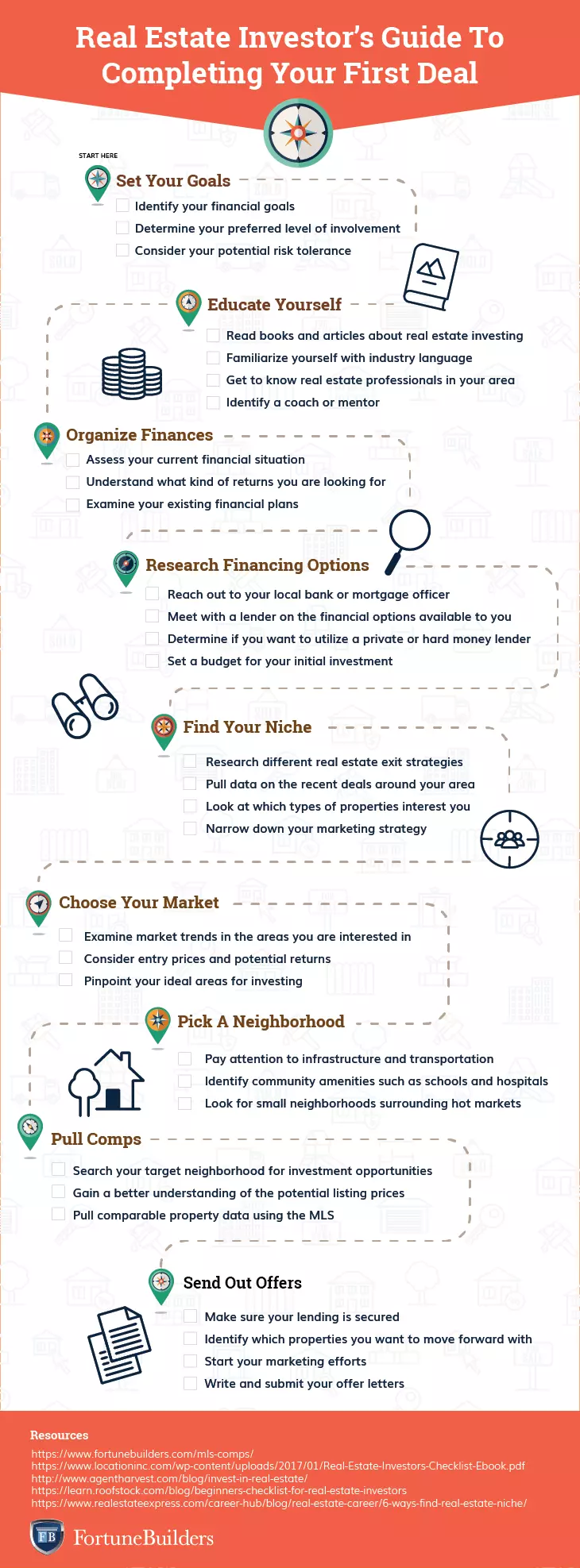Real estate investing holds the potential to provide financial freedom and the opportunity to become your own boss. However, it's not as easy as flipping a switch. As a beginner real estate investor, it's crucial to do thorough research and establish a strong framework before diving into the business. Familiarizing yourself with the real estate industry and understanding the basics will contribute to your success in the field.
Am I Ready To Invest In Real Estate?
Don't be discouraged by your limited access to cash as a beginner. Many aspiring investors make the mistake of ruling themselves out due to a lack of capital. However, your financial standing is just one factor to consider when embarking on a real estate investing career. Before getting started, ask yourself some important questions:
- Are my finances in order?
- How much risk am I willing to take on?
- What are my investing and financial goals?
- How much time can I devote to my business?
- Do I want to partner with someone?
- Do I have access to real estate training or a mentor?
Answering these questions will help you avoid potential problems as you begin your investing journey. Remember, real estate investment comes with risks, but it's essential to identify your risk tolerance. By assessing your finances, risk tolerance, and goals, you can set a clear path for your future.
Time is another critical aspect to consider. How much time are you willing to dedicate to your real estate investing career? In the beginning, you may need to invest extra time to familiarize yourself with the industry. Additionally, partnering with someone can help you free up time and ease the transition as you start.
Lastly, access to real estate education is crucial for success. Look for real estate mentors, training programs, books, podcasts, and blogs that can help you expand your knowledge. Learning more about real estate will equip you with the skills necessary to make informed investment decisions.
 Image Source: Saigonintela.vn
Image Source: Saigonintela.vn
Defining Your Exit Strategy
As you delve into real estate investing, familiarize yourself with different exit strategies. An exit strategy refers to how investors plan to "exit" a specific real estate deal. Some common exit strategies include:
- Rehabbing: Purchasing a property, renovating it, and selling it for a profit.
- Wholesaling: Acting as the middleman between sellers and buyers, quickly selling a property or contract for a profit.
- Pre-habbing: Purchasing a property and making minimal repairs to sell it, usually to someone willing to continue the renovations.
- Buy and Hold: Purchasing or renovating a property with the intention of renting it out for steady returns.
Understanding these strategies will help you make informed decisions and maximize your profits.
Ultimate Checklist For Beginner Real Estate Investors
To help you get started on your real estate investing journey, here's a checklist outlining the key steps:
- Set clear goals for your investments.
- Educate yourself by reading books, listening to podcasts, attending trainings, or finding a mentor.
- Organize your finances and evaluate your credit standing.
- Get pre-approved by meeting with financial institutions or mortgage officers.
- Find your niche in the real estate market.
- Choose a market to focus on.
- Select a neighborhood that aligns with your investment goals.
- Analyze comparative property data (comps).
- Make an offer on a property.
 Image Source: Saigonintela.vn
Image Source: Saigonintela.vn
Setting Goals
Examine your financial goals, career plans, and retirement options. Determine the returns you are looking to achieve and the level of risk you are comfortable with. Setting goals for your real estate education is equally important. Make it a habit to read real estate books, listen to investing podcasts, attend trainings, and find a mentor or coach who can guide you.
The Financials
Evaluate your current financial situation, including any existing credit cards or loans. This will help you interact with potential lenders. Explore different exit strategies that align with your financial goals. Contact banks or mortgage officers to understand the capital you'll have to work with.
Choosing The Area
Research the demographics of different areas in your locality to identify potential markets for investment. Consider factors like average age, spending habits, and population to get a better understanding of market demand. Analyze the real estate market by examining price-to-rent ratios, potential cash flow, and appreciation potential. Look for up-and-coming or well-established neighborhoods.
Pulling The Trigger
Based on your chosen exit strategy, study comparable property data in the area. Utilize the Multiple Listing Service (MLS) to gain insights into potential returns. Prepare yourself financially and create a written offer letter when you find the right property. Ensure your finances are in order before making an offer.
Real Estate Investing 101: Property Red Flags
As you gain experience in real estate investing, you'll become more adept at identifying potential red flags. However, as a beginner, it's helpful to have a designated list handy to avoid critical mistakes. Here are a few common mistakes to avoid:
- Be cautious with financing options and avoid unrealistic situations. High-interest rates or loans with balloon payments can be detrimental to your financial standing as a beginner.
- Develop a robust system for analyzing deals. Underestimating renovation costs is a common mistake. Careful planning and allowing wiggle room in your schedule and budget can prevent this.
- Take comparable sales seriously. Accurately predicting listing prices or rental values requires considering neighborhood factors and comps.
- Factor in maintenance and holding costs. Underestimating the time it takes to sell a property can lead to profit loss. Pay attention to the average length of time properties in the neighborhood sell for.
Summary
Real estate investing can offer numerous benefits for aspiring investors. Approach it with a focused mindset, be prepared to educate yourself, and exercise due diligence in your financial decisions. With the right work ethic, mindset, and systems in place, you can achieve financial success as a beginner real estate investor.
How long have you been investing in real estate? Let me know which tip you found most helpful at the beginning of your career.











